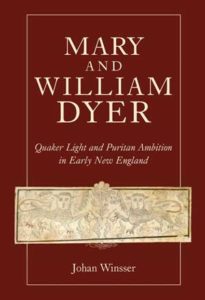Mary and William Dyer: Quaker Light and Puritan Ambition in Early New England
Reviewed by Gwen Gosney Erickson
June 1, 2018
 By Johan Winsser. Self-published, 2017. 345 pages (includes appendix and extensive notes). $24.95/paperback; $9.99/eBook.
By Johan Winsser. Self-published, 2017. 345 pages (includes appendix and extensive notes). $24.95/paperback; $9.99/eBook.
Buy from QuakerBooks
Mary Dyer’s story as a Quaker martyr is captivating, and one may have at least a passing familiarity with it, even if only through Sylvia Shaw Judson’s statues at Earlham College, Boston Common, and Philadelphia’s Friends Center. Author Johan Winsser notes in his opening acknowledgements that he met Dyer through these casual, public representations. He later had opportunities for study with Quaker mentors Hugh Barbour and Elmer Brown.
Dyer’s story has been told many times and places over the years, both in scholarly works and fictional interpretations. Winsser’s telling brings a fuller understanding by contextualizing the life of Mary Dyer—along with her life partner, William—in the cultural and political setting of their time.
While this is a biography that enlightens readers about the experiences of Mary and William Dyer, it is also a resource for gaining insight into actions and influences in seventeenth-century New England. Archival sources are meticulously presented through a captivating story that includes the cultural landscapes of the Dyers’ birthplaces in England, and of the evolving colonies of Massachusetts and Rhode Island. Winsser does an admirable job weaving together scraps of historical record specific to the Dyers with impressive research into the controversies and influential characters who populated the Dyers’ world. Readers can opt to immerse themselves even more fully by perusing the hundred pages of notes included at the end of the book.
Mary Dyer’s story as the Quaker executed by the Puritans is one that captures the imagination. Winsser’s biography presents an account richer than the traditional Quaker hagiography or fictional retellings. Adding William’s story illuminates the greater complexities of Mary Dyer’s life as a wife, mother, and community member. The Dyers were a founding family of Rhode Island who were well connected and not without resources. In addition to dates and property details verified in civil records, the Dyers are presented with their own words through their 1659 letters, which are described in the main text and published in full as an appendix. Mary Dyer’s example as a woman who persisted and gave her life for religious freedom by confronting Puritan orthodoxy and New England leadership is a powerful one. This well-written book gives those wishing to read beyond the surface a welcome invitation to reflect more deeply on the circumstances and leadings of her life.



Comments on Friendsjournal.org may be used in the Forum of the print magazine and may be edited for length and clarity.